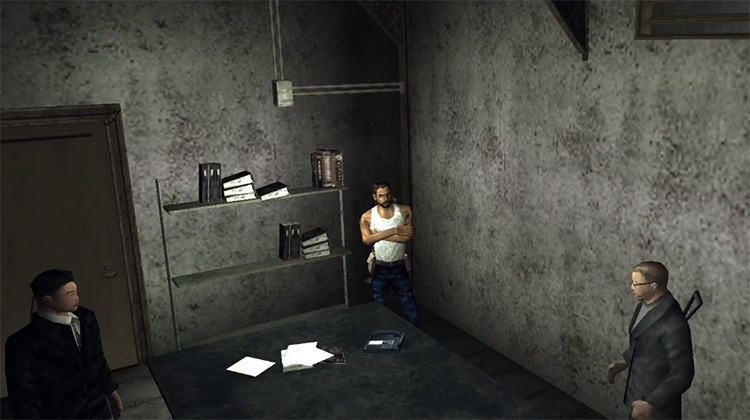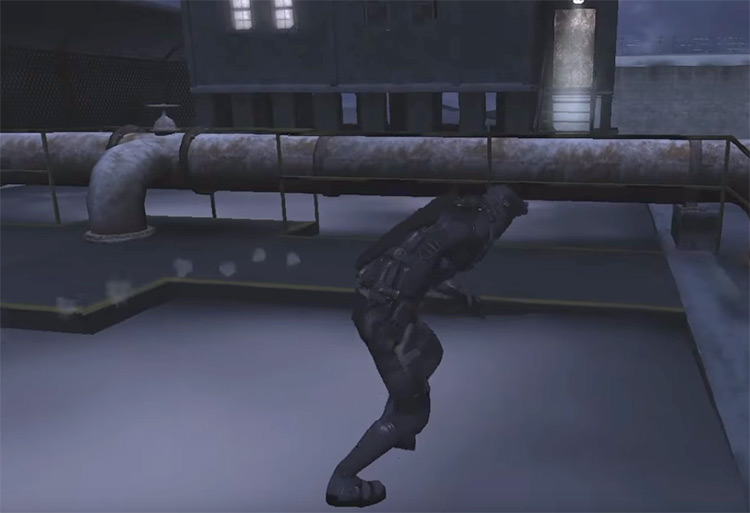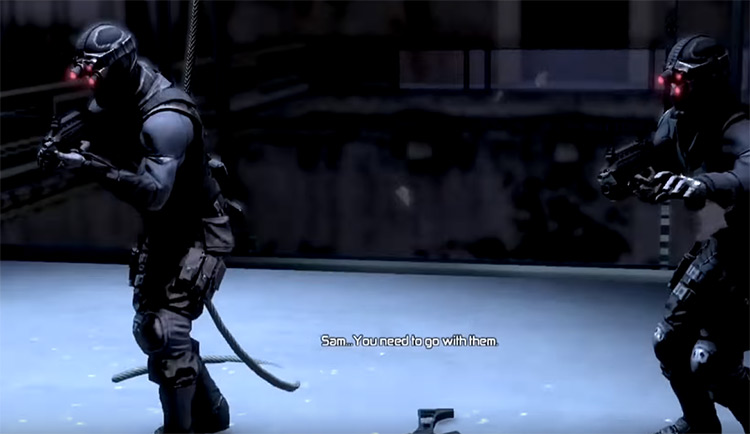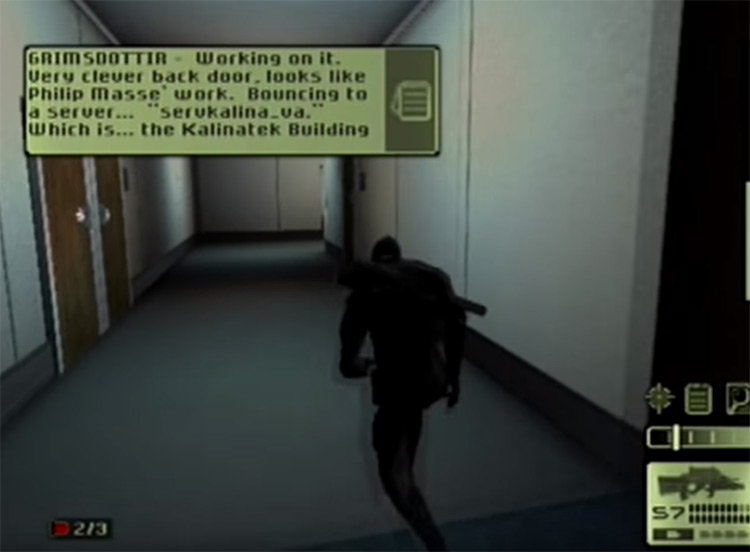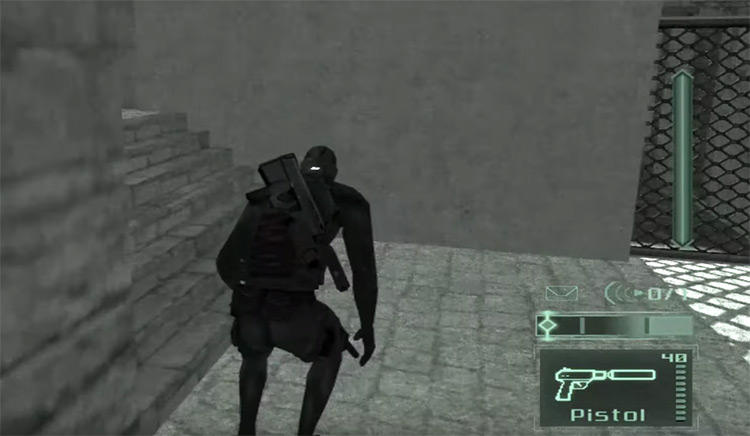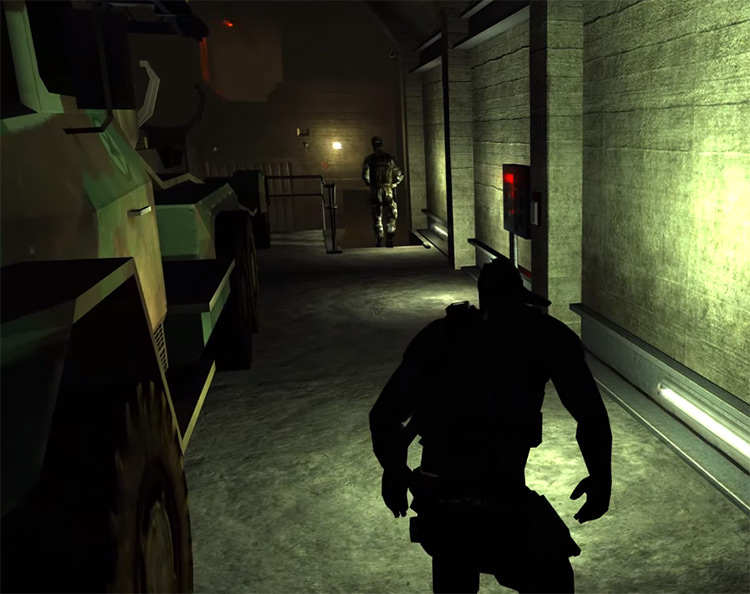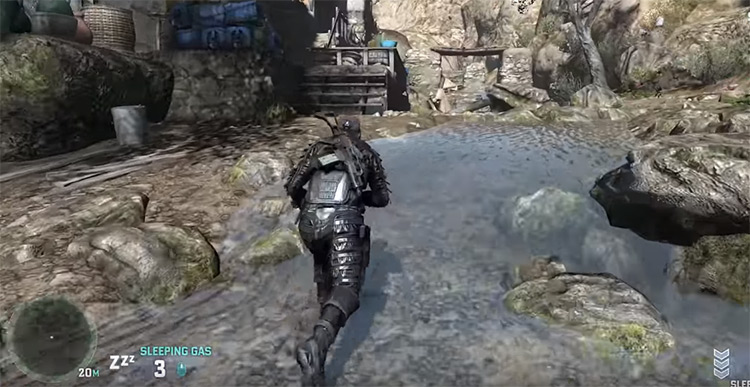Not only does it offer very fluid gameplay and an action-packed story sure to get even the least convinced interested in seeing it play out, but it also serves as a showcase of what the stealth genre is supposed to be. It isn’t slow or boring just because it’s not about blowing up alien brains. On the contrary, few things will get your blood pumping like just barely slipping by guards ready to blow up your own skull if they so much as smell you. It’s the only stealth franchise that can even compare to Metal Gear Solid in terms of quality and innovation – and that’s not something I say lightly at all. So whether you’re a fan of the genre thirsting for some good-old sneaking action, or just a newbie trying to see what all your pseudo-intellectual friends are so adamant about you trying, here’s a comprehensive ranking of every Tom Clancy’s Splinter Cell game ever released.
7. Tom Clancy’s Splinter Cell: Essentials (2006)
As much as I love the PSP and the sheer quality of the games that made their way into the system’s roster, it’s also the home for some of the most terrible attempts at porting a AAA experience to a portable device. Developed by Ubisoft Montreal, Essentials was released along with Tom Clancy’s Splinter Cell: Double Agent as a companion title in the same way AC: Bloodlines was for Assassin’s Creed II. SC: Essentials takes place just after the events of Double Agent, as Sam Fisher is taken into custody by American authorities and questioned about what transpired. Every level is essentially a flashback as he recounts his story for the interview. The thing is, that despite the levels being mostly rearrangements of missions from the previous three games, they’ve been drained of all color and fun. Not only that, but the controls are among the worst I’ve ever seen in a stealth game – and I played the original MGS.
6. Tom Clancy’s Splinter Cell: Double Agent (2006)
You should know that two versions of Double Agent were developed by different teams. One for Xbox 360 and PS3, and the other for the GameCube and Wii release of the game. Since Nintendo’s version is a disappointing mess, I’ll focus on the Xbox & PS versions. After being told that his daughter has been killed, Sam Fisher falls into a deep depressive state. Until he’s contacted to take on a new mission: infiltrate a terrorist organization and work as a double agent to take them down from the inside. This game was heavily criticized for its decidedly less stealthy approach and the surprising lack of a HUD. But even then, it’d be unfair to call this game bad. Despite these small gameplay blunders, the game features the most engaging story in the franchise to that point, developing Sam’s character and letting players have a say in how the story would play out based on the way they completed missions. That said, I’ve got to say… what’s the point of making you infiltrate a criminal organization if your employers are going to lose trust in you when you’re just trying not to blow your cover? Assholes.
5. Tom Clancy’s Splinter Cell: Conviction (2010)
If Double Agent skimmed off a bit of stealth from its gameplay, its sequel completely threw it out the window. After being stuck in development hell for a few years, Ubisoft Montreal finally released the new chapter in Sam Fisher’s story, which features him beating up a lot of people to take back his alive but now-kidnapped daughter. Unlike previous games where remaining undetected was necessary to get through levels, Conviction not only allows but encourages you to engage in all-out firefights, leaving a trail of corpses worthy of John Wick. It’s a really good third-person shooter with an engaging narrative. But it’s hard to call it a classic Splinter Cell game.
4. Tom Clancy’s Splinter Cell (2002)
The original Splinter Cell on the Xbox and PS2 took the stealth genre by surprise. And for a little while it was an even better proponent of it than the well-established MGS franchise. Not only was the gameplay incredibly fluid, with an over-the-shoulder perspective and responsive controls, but it introduced a wide array of creative stealth mechanics like blowing up lights to slip by shrouded in darkness. It was also more accessible for Western fans than MGS, as the story of black ops agent Sam Fisher hunting down a Russian plutocrat was easier to grasp than the former’s deeply metaphoric and decidedly more Japanese narrative. Plus it had a pretty solid GBA port, all things considered.
3. Tom Clancy’s Splinter Cell: Pandora Tomorrow (2004)
A couple of years later, Ubisoft Shanghai took everything that made the original Splinter Cell work and elevated it to the next level with Pandora Tomorrow. Which coincidentally has the most 007-sounding title in the series. The story, which follows Sam as he methodically dismantles an Indonesian anti-separatist militia planning a terrorist biological attack, isn’t anything to write home about, but the varied environments including bases deep in the jungle manage to keep things interesting. Regrettably, the game’s level design is a bit too linear. Still fun to play but noticeable. This coupled with a seemingly dumbed-down enemy AI fails at making the new mechanics, such as whistling to attract guard’s attention, really shine.
2. Tom Clancy’s Splinter Cell: Chaos Theory (2005)
I’d say what Pandora Tomorrow did best was serve as a stepping-stone for the next game in the series, a true masterpiece in the stealth genre – Tom Clancy’s Splinter Cell: Chaos Theory. The game doubles down on its stealth component, giving Sam new abilities like determining just how much sound he’s making in comparison with his surroundings, but also presents several new challenges that make these skills vital for the agent. Other than having the most sophisticated stealth mechanics, the game allows you to pick your loadout before missions. And it fittingly offers a lot of freedom to progress through the levels and complete your objectives. Just… make sure you never play the NDS port.
1. Tom Clancy’s Splinter Cell: Blacklist (2013)
I know what you’re thinking. “What? Blacklist over Chaos Theory? Is this baldie insane?” The thing is, I’m interested in getting as many players as I can to try out the series. And Blacklist is at the same time the most accessible and the most universally appealing release in the entire franchise. Ubisoft Toronto did a superb job at taking the action-oriented Conviction gameplay and injecting back all of the stealth mechanics that make up the Splinter Cell personality. You get to choose how to tackle each situation, whether that means being a silent killer or a violent maniac. Not only that, but the gameplay is the most fluid it has ever been. And the graphics continue to look stunning after so many years. Maybe if enough people buy this game from the PSN or Xbox Live Marketplace, well who knows? Maybe Ubisoft will finally decide to continue the series.
